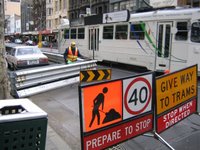 Ever since John Roudebush has joined our team and our board of directors, I pay attention to street signs. I snapped this photo on my recent trip to Melbourne, Australia. I was there helping set up our new sales and support center. Why do I pay attention to street signs you may ask...let me explain.
Ever since John Roudebush has joined our team and our board of directors, I pay attention to street signs. I snapped this photo on my recent trip to Melbourne, Australia. I was there helping set up our new sales and support center. Why do I pay attention to street signs you may ask...let me explain.John spent his entire career in the highway services/roadway building business. He joined our board because he absolutely believes that companies with mobile workforces need mobile handheld solutions to run remote projects efficiently. John explains how his work crews required project data on the job site - data that was only available on paper back at the office. In addition, operations managers in the office, were always seeking data from remote project sites. How much work got done today...are we on schedule....when do we need more materials delivered... In his career this was always done by inefficient paper forms that were often delayed for days and weeks.
Here is an situation he sited - construction companies often rent safety and street signs for use on road building/maintenance projects. These are mobile assets that are often lost and misplaced. The company renting these signs need barcoded or RFID enabled tags on these signs so accurate inventory and accounting of the location of these assets can be known and managed.
Yet another story - he remembers a sign companies never returning for signs and how eventually the grass and weeds simply grew over these assets as they decayed.
Additional examples - road building companies often make a significant amount of their profit by meeting or exceeding quality standards, and by meeting project deadlines. This requires real time data from the project being sent to the project managers and business managers to ensure the right management and resources are being dedicated to the project to hit these numbers. If there is a problem, and it is found early, it can be quickly corrected so as to minimize impact on the quality and schedules. If the data is delayed, trapped on a paper form on a truck's seat, and nobody has visibility to it, then the damage can be great.


No comments:
Post a Comment